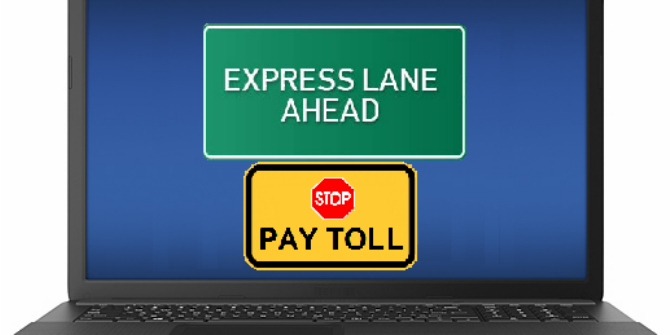 On 9 July, a resolution in a plenary session of the European Parliament recognized the notion of ‘public domain’ for the first time in Europe, on the initiative of MEP Julia Reda. This important step elevates the public domain to the same regulatory space as exclusive rights, considering the rights of users and their default entitlement in the absence of copyright. As part of the LSE Law and Communications Research Network Seminar series, Melanie Dulong de Rosnay and Orla Lynskey compared default entitlements to information in the areas of copyright and data protection law. Here, in the first of a two-part series, Melanie explains the implications of the report and the relevant background.
On 9 July, a resolution in a plenary session of the European Parliament recognized the notion of ‘public domain’ for the first time in Europe, on the initiative of MEP Julia Reda. This important step elevates the public domain to the same regulatory space as exclusive rights, considering the rights of users and their default entitlement in the absence of copyright. As part of the LSE Law and Communications Research Network Seminar series, Melanie Dulong de Rosnay and Orla Lynskey compared default entitlements to information in the areas of copyright and data protection law. Here, in the first of a two-part series, Melanie explains the implications of the report and the relevant background.
An introduction to the public domain in copyright legislation
Copyright legislation applies by default: right holders must grant permission or licenses to reproduce and distribute works including texts, photos, databases or websites. Similarly, personal data is private by default and the informed consent of a person is required to collect and process data related to him or her. Both types of legislation require separate permission for each different use.
In theory, the concept of the public domain envisions information as belonging by default to society at large, providing an alternative to the usual entitlement to private persons. In copyright law, the notion of the Public Domain allows for the cancellation or limitation of default private entitlements, enabling the distribution and re-use of information without restrictions under certain circumstances.
The public domain can be interpreted negatively – as something with no clear definition that applies to information not governed by other default entitlements. On the other hand, it can be interpreted positively as the default state of information before the apparition of law (“The Public Domain is the rule, copyright protection is the exception”, says Communia Public Domain Manifesto), but this alternative interpretation is not widespread.
Similar mechanisms granting default entitlements to data subjects can be noted under data protection law. And in both fields, debates exist between maximalists – who wish to extend the reach of copyright and data protection (private entitlement by default) – and minimalists – who seek the expansion of publicly available data which can be freely reused by default. Typically, controversies between maximalists and minimalists of both copyright and data protection pit two groups against each other:
- Digital rights activists, who will typically support a large public entitlement to copyright (copyright minimalists) and a large private entitlement to personal data (data protection maximalists), and
- Industries, which on the contrary are relying on strong copyright private entitlement (copyright maximalists, or extremists according to another rhetoric) and limited private entitlement on personal data, allowing wide data processing and data mining (data protection minimalists).
Julia Reda’s report on copyright reform
Current debates about copyright reform illustrate political disagreement regarding what is/should be in the public domain. MEP Julia Reda’s report on the European Union Copyright Directive (Implementation of Directive 2001/29/EC on the harmonisation of certain aspects of copyright and related rights in the information society) released in January 2015 showed the emergence of the public voice, speaking up for users’ rights and a recognition of the public domain. The line of thought is gaining ground within the Pirate Party, with some (including former MEP Amelia Andersdotter) in favour of more radical reform towards larger public entitlement and copyright minimalism.
Recommendations 5, 6 and 7 of the report provided a legal basis to strengthen the public domain, in line with the 2012 Communia agenda for a positive public domain. The physical public domain is also addressed in recommendation 16 to allow freedom of panorama and correct one of the anomalies of current copyright. It was intended to enlarge public entitlement to copyrighted works which are physically in the public domain, meaning for example that it would become possible to reproduce photography of a copyrighted work in a public place, such as a statue or a building.
The report’s proposals to adapt exceptions and limitations could all be implemented into concrete reforms to finally make copyright fit the digital age, by recognising standard usages such as remix, audiovisual quotation or the mission of libraries and educators. However, framing text and data mining as an exception to private entitlement by default could be problematic as it de facto denies that this activity is part of a positive right to read and should not require additional permission nor licensing.
The report, by acknowledging the system in place, made strategic progress while avoiding proposals which could have been considered controversial by the industry and jeopardise the adoption of the rest of the report. It could have gone further and prompt discussion on the introduction of copyright registration or sanctions for copyfraud, the exclusive control over public domain works, which would have provided a legal basis to public entitlement by default.
The case of public sector information
Data protection raising from the Data Protection Directive (and the proposed General Data Protection Regulation – (G)DPR) is often at odds with principles of reuse at the core of the movement for open data and open access to public sector information as framed by the Public Sector Information Directive of 2013. This conflict leads to an extension of the nature of what is considered personal data. According to the LAPSI Position paper on Access to Data, the application of a precautionary principle will limit the release of open data and therefore reduce the amount of information available for public entitlement since personal data cannot be used or processed for unforeseen purposes or in a different context without consent. Techno-legal solutions are to be explored, from data aggregation to privacy-by-design and anonymisation from the start of the collection process.
Personality rights can’t be relinquished and any voluntary default entitlement to the public domain would be invalid: such limits are moral rights and the right to image of subjects for copyright, and the right to delete for data protection. Freedom of expression will justify an exception to copyright and therefore favour the public domain instead of the right owner, and will similarly advocate for public entitlement to data instead of limiting the access to the data subject only. Freedom of information laws will foster access to public sector information under both legal schemes.
A vote of compromise
The report had proposed to exempt works produced by the public sector from copyright, placing them in a de facto statutory public domain. This proposition was deleted by one of the amendments voted on 16 June 2015, which recommends to further protect personal information instead of fully lowering the barriers to the re-use of public sector information.
Amendment 6 calls on the Commission to “effectively safeguard public domain works, which are by definition not subject to copyright protection; therefore urges the Commission to clarify that once a work is in the public domain, any digitisation of the work which does not constitute a new, transformative work, stays in the public domain”, therefore protecting the public domain against further private entitlement when digitized. It “also calls on the Commission to examine whether rightholders may be given the right to dedicate their works to the public domain, in whole or in part”, therefore opening the door to the recognition of an anticipated, voluntary temporal public domain.
Amendment 7 calls on the Commission to deal with the temporal public domain and recommend to refrain “from any further extension of the term of protection” while amendment 9 examines “the possibility of reviewing a number of the existing exceptions and limitations in order to better adapt them to the digital environment” in less ambitious terms than the initial report but nonetheless addressing the functional public domain, calling for “the adoption of an exception allowing libraries to digitalise content for the purposes of consultation, cataloguing and archiving” being the further step taken to ensure the effective availability and preservation of a public domain for future generations.
While bringing substantive progress and a recognition for the public domain, the report (to be voted on) did not go far enough. The author had to compromise so much with copyright maximalist opponents that it was doomed to fail to achieve real in depth-reform, as was observed by copyright minimalism advocates.
These articles give the views of the authors, and do not represent the position of the LSE Media Policy Project blog, nor of the London School of Economics and Political Science.





I’m not certain the place you are getting your information, but good topic.
I needs to spend a while studying more or working out more.
Thanks for magnificent info I was looking for
this information for my mission.